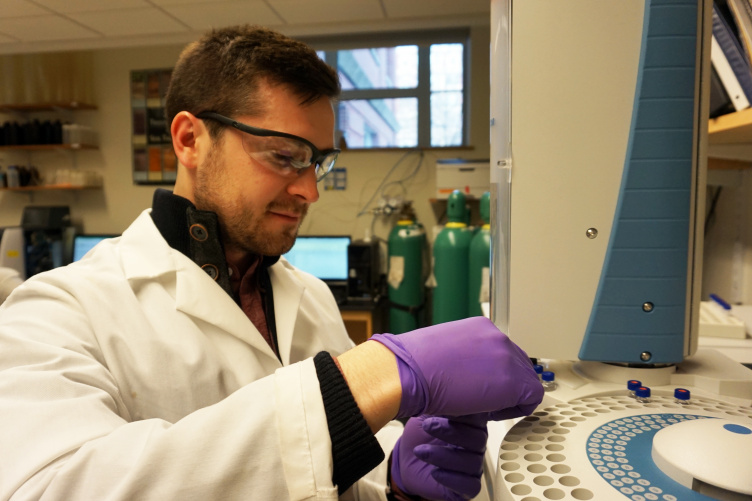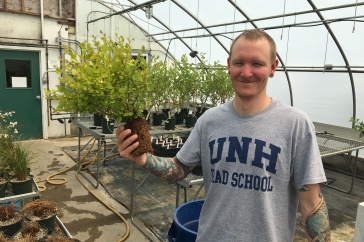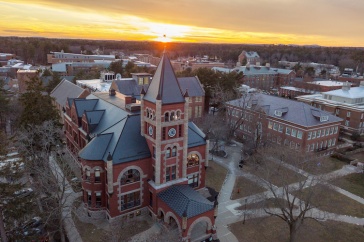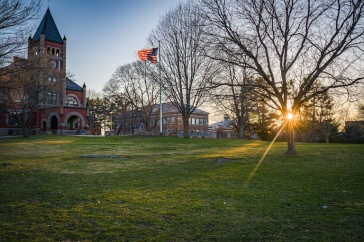
A few days before heading home to North Liberty, Iowa, for Thanksgiving, Bennett Thompson, a graduate student in UNH’s natural resources program, got some news that he said would make talks over turkey a lot more exciting: He’d been named a Presidential Management Fellows (PMF) program finalist.
The highly competitive two-year program connects finalists with participating federal agencies that are looking to hire exceptional advanced-degree candidates for what will potentially lead to a successful career in public service. Once the finalists are selected, they have one year to find a job with one of the agencies.
Thompson follows Amanda Daly, an Earth and environmental sciences doctoral candidate who was named a PMF finalist in 2017. Like Thompson, Daly worked in Stuart Grandy’s lab. Grandy is an associate professor of natural resources and the environment, NH Agricultural Experiment Station researcher and a highly regarded soil scientist.
COLSA: Which federal agency would you like to work with?
The more I've learned, the more I'm gripped by soil's infinite complexity — one gram can contain millions of organisms with a diversity of forms and functions we're only beginning to grasp. There's a whole universe beneath our feet!
Bennett Thompson: I'm excited to explore the range of appointment opportunities, but I think working with the U.S. Department of Agriculture would give me the best chance to put my interests in agricultural productivity and sustainability to service.
COLSA: What do you hope to accomplish as a result of the fellowship?
Thompson: I've been thinking a lot about how to transition from a research-intensive, basic science degree to a career focused on outreach and the application of scientific knowledge. I think the PMF provides an unmatched opportunity to make that transition, in part through its emphasis on leadership training. I hope that as a fellow I can take this rich body of knowledge I've assembled while at UNH and use it to benefit the American people.
COLSA: How would you explain your discipline and/or research if you were at a party?
Thompson: I study how agricultural management affects soil microbes and how those changes can help — or hurt — farmers. Specifically, I am researching whether different communities of microbes process nitrogen differently and whether that can change how much nitrogen microbes provide to crops from the soil.
COLSA: What do you wish your colleagues/friends/family knew about your work?
Thompson: I inherited my interest in soil from friends and family who farm or garden, and they taught me how important soil is. But I guess what I wish I could share with them is the sense of awe I get from studying soil. The more I've learned, the more I'm gripped by soil's infinite complexity — one gram can contain millions of organisms with a diversity of forms and functions we're only beginning to grasp. There's a whole universe beneath our feet!
COLSA: Why is your research important?
Thompson: American agriculture is faced with a Herculean task: increasing productivity without exacerbating pollution, all while climate is rapidly changing. Understanding the soil ecosystem is critical to this goal, and I hope that my research can contribute to farmers' ability to work with and optimize services from the soil.
COLSA: Why did you choose UNH for your master’s degree?
Thompson: I chose UNH initially because I was eager about the opportunity to work with Dr. Grandy. He has done some really cool work advancing our understanding of soil carbon, and I've had the pleasure of working on his new projects in nitrogen mineralization. But since I've been here, I've found the UNH Graduate School and department of natural resources to be a tight-knit, dynamic community. As a native Iowan, too, I've relished the experience of living in New England.
COLSA: How has working with Stuart Grandy impacted you and your work?
Thompson: Stuart once told me, "Soils are an incredible canvas for an active imagination." I've had a lot of fun working with him because imagination and creativity are central to his approach to the unknowns of soil. But I think Stuart has also impressed upon me that scientists have an important leadership role in society. I think there's an urge in most scientists to put our heads down and focus on our pursuit of evidence and truth. While that's important, we also have an obligation to use and advocate for that knowledge in broader society.
-
Written By:
Sarah Schaier | College of Life Sciences and Agriculture



















































